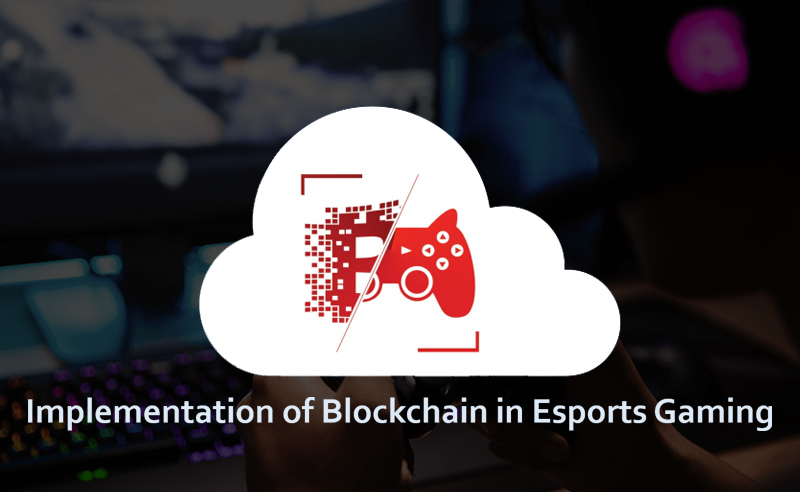Table of Contents
Blockchain technology is gaining popularity not only in the financial sector with its breakthrough cryptocurrency but is diversifying omnidirectional. The key features of blockchain-like decentralization which excludes the need of intermediary while facilitating the peer-to-peer transaction of payment, immutability which prohibits the data alteration and the transparency of network due to the record of the transaction being maintained on a distributed ledger, captivating the interest of various sectors to overcome the challenges faced by the community. One of the budding industries of gaming trying to revolutionize the experience of the players by deploying blockchain technology in their network. Particularly, Esports or electronic sports or umbrella term for video games competition is utilizing the blockchain networks to overcome the hurdles being faced to reach enthusiasts all across the world. Let us try to understand the implications of blockchain for Esports gaming.
Esports: Quick Overview | Blockchain For Esports Gaming
One of the constant growing sectors among the video games lovers is that of esports gaming. In simpler terms, it is an online competition of video games (played by anyone with upgraded systems!). Gamers can compete for one-on-one or in teams, winners are rewarded heavily and their prospects in the esports industry pace up. Some of the trendy games are Defence of Ancients 2 (Dota 2), Counter-Strike: Global Offensive, League of Legends, Heroes of the Storm, and Call of Duty: Infinite Warfare.

Esports is one of the digital markets which is growing at the fastest pace in the gaming industry wiping off the millions in terms of revenue. Analysts predicted that the global esports market might cross $1.70 billion by the end of 2020 (Obviously they did not know about a pandemic at that time!). So, when billions of dollars are at stake, technologies must intervene to boost up the growth which could be hampered by a few of the problems associated with esports.
Challenges Arresting The Growth Of Esports

When any industry starts advancing, it always faces some or the other challenges, which become necessary for the industry to conquer. Presently, the esports industry is also confronting a few of the obstacles as following:
- The absence of transparency in the network results in delaying funds received (from sponsors to winners), rewards payment controversies, and exploitation of players (unprotected rights!). Developers also suffer due to the lack of transparent networks.
- Esports is still not completely legalize industry, thereby issues related to the mode of payments remain prevalent in present conditions
- Match-fixing is popping as one of the latest issues as the organizers are continuously involved in bribing the players (to win the betting money), as they can easily trace them. Hence, the problem of anonymity is being faced by the esports industry.
- Players either face difficulty or have to charge heavy commission fees while withdrawing their funds after winning a game.
- Lack of a secured network hampers the growth of industry whether in terms of the upgrading of games, entry of new players, and majorly crowd funders.
The industry of Esports may have slowed down by problems like lack of transparency, anonymity, security, data management, and many more. But, as the industry is itself based on hi-technology, it started utilizing the potential of blockchain technology to maintain its exponential traction. Blockchain for esports gaming had already initiated to provide the new dimension to the esports or online video games. Let us try to explore the magic of blockchain technology which is reshaping the gaming industry.
Implementation Of Blockchain In Esports Gaming

When blockchain technology was first introduced via cryptocurrency, nobody imagined it can be employed in the gaming industry. But, currently, the technology assures the level playing field not only for the players but for developers, sponsors, media houses, streamers, etc. The implementation of blockchain in Esports gaming can be summarised as:
- Decentralized ledger in combination with smart contracts aids players to receive their rewards on time with the preferred mode of payment. It also facilitates timely payment for media rights, sponsorship, and fees of developers. Thereby providing a decentralized network to the stakeholders of the industry.
- Blockchain technology helps in lowering down maintenance costs and operating secured databases. As blockchain is based on the model of peer-to-peer exchange, the build-in redundancy bolsters the esports network
- The gaming industry is generally involved in illegal gambling, match-fixing, fraudulent practices, and many more. Esports is also facing similar hurdles that can be overcome by deploying blockchain-based cryptocurrency. Payments in crypto assets are immutable, transparent, and also there is no need for central authorities to manage and back them.
- Anonymity can be maintained with the stimulation of blockchain for esports gaming. This feature of blockchain can reduce the challenges of match-fixing, pressure of sponsors on players, and ultimately decrease the cost to run or organize tournaments.
- One of the situations related to “chargebacks” puts the players in a position of disadvantage. In the esports industry, many times viewers donate to their favorite players but sometimes scammers ask for “chargeback” or request the player to return the money back. The problem of chargeback can be avoided by utilizing the transparent ledger system which will make it easier to justify the chargebacks.
- DApps or Decentralised Applications with blockchain platforms of Etherum, NEO, Eos, and Lisk have the potential to completely revolutionize the experience of esports gaming. Developers can easily implement the changes, develop the most trendy features in the games associated, assure consumers and other players of the industry about the user-friendly gaming industry.
Thus, the use of blockchain in gaming cannot be ignored to become the multi-billionaire sector of the gaming and entertainment industry.
Some of the blockchain projects:
- Enjin: provides integrated blockchain software products to gamers, developers, enthusiasts, and many more.
- FirstBlood: Allow user to test skills and bets with no transaction fees or any regulation charges in secured network
- Izetex Network: Provides a platform for developers to develop new games
- Unikoin Gold: decentralize secured platform for sports betting
- DreamTeam: Combination of smart contracts and blockchain platform providing a secured network for payment.
- Tron: Platform which provides foundational layer for game developers
Summing Up
Gaming is constantly growing at an exponential rate and now when blockchain technology is providing the extra power to the industry (players, coaches, regulatory, and many more), it is expected to rise up in upcoming years. The blockchain for esports gaming is successfully bringing the new platforms, better experiences, hassle-free approaches, and returning the sportsman spirit among players (degraded by fraud practices!). Though it is too early to decide the future of any industry but the esports sector of the gaming industry would certainly flourish in the coming decades.
Articles You May Read

